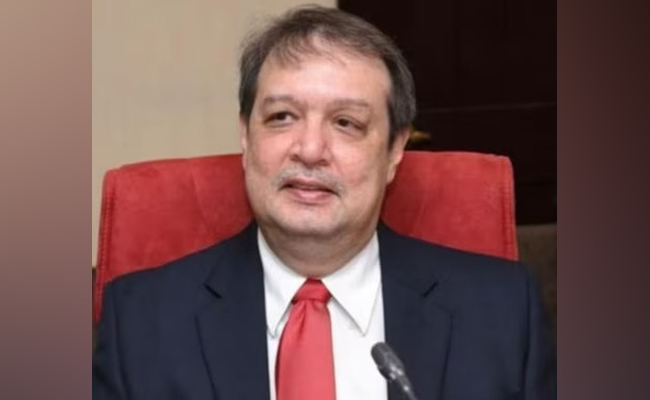New Delhi (PTI): Dissenting from the majority judgment, Supreme Court's Justice J B Pardiwala on Thursday held that Section 6A of the Citizenship Act of 1955, which grants Indian citizenship to immigrants who entered Assam between January 1, 1966, and March 25, 1971, was arbitrary and constitutionally invalid.
In a dissenting opinion, Justice Pardiwala said the open-ended nature of Section 6A had become more prone to abuse due to the advent of forged documents.
"The open-ended nature of Section 6A has, with the passage time, become more prone to abuse due to the advent of forged documents to establish, inter-alia (among other things), wrong date of entry into Assam, inaccurate lineage, falsified government records created by corrupt officials, dishonest corroboration of the date of entry by other relatives so as to aid illegal immigrants who are otherwise not eligible under Section 6A by virtue of having entered into Assam after March 24,1971," he noted in a separate 127-page dissenting judgement.
Justice Pardiwala said Section 6A promotes further immigration into Assam without any end date of application and immigrants come hoping with forged documents to set up the defence of belonging to pre-1966 or the 1966-71 stream upon identification as a foreigner and reference to the tribunal.
The judge said while the object that was sought to be achieved with the enactment of Section 6A of the Citizenship Act remained a distant dream, its misuse had only continued to increase with the passage of time.
"I say so because with the passage of time, the government records would get damaged and perish, making it increasingly difficult to cross-check the false claims that may be made by the immigrants of the post-1971 stream trying to misuse the benefits conferred exclusively to the immigrants of the pre1971 stream," observed Justice Pardiwala.
He further said that Section 6A, in the absence of any temporal limit to its application, was being counter-productive to the object of enactment.
"Neither Section 6A nor the rules made thereunder prescribe any outer time-limit for the completion of detection of all such persons who belong to the 1966-71 stream and are eligible to avail the benefits of Section 6A(3). The clock only starts to tick once the detection is made by the foreigners tribunal and there is no prescription as to the period of time within which the exercise of detection is to be completed from the commencement of Section 6A," he underlined.
Justice Pardiwala said the absence of any prescribed time-limit for detection of foreigners of the 1966-71 stream has adverse consequences as it relieved the state from the burden of legally identifying, detecting, and deleting from the electoral rolls, all immigrants of the stream.
"Secondly, it incentivises the immigrants belonging to the 1966-71 stream to continue to remain on the electoral rolls for an indefinite period and only get themselves registered under Section 6A once detected by a competent tribunal. Hence, the manner in which the provision is worded, counter-serves the very purpose of its enactment," the judge said.
Justice Pardiwala said that Section 6A had failed the test of temporal arbitrariness or temporal unreasonableness, acquiring unconstitutionality with the passage of time.
The mandate of timely detection and deportation of illegal immigrants was the fundamental premise on which the Assam Accord was signed, the minority verdict highlighted.
According to the judge, this intention was never translated statutorily, owing to a faulty mechanism prescribed under Section 6A(3), either due to "inadvertence or advertence" of the legislature.
"I have reached the conclusion that Section 6A of the Citizenship Act deserves to be declared invalid with prospective effect," he added.
However, the majority verdict of the apex court Constitution bench led by Chief Justice of India D Y Chandrachud upheld the constitutional validity of Section 6A of the Citizenship Act and said the Assam Accord was a political solution to the problem of illegal migration.
Section 6A was inserted into the Citizenship Act as a special provision to deal with the citizenship of people covered under the Assam Accord.
The provision was incorporated in 1985 following the signing of the Assam Accord between the then Rajiv Gandhi government at the Centre and the All Assam Students’ Union (AASU).
It says those who came to Assam on or after January 1, 1966, but before March 25, 1971, from specified territories, including Bangladesh, in accordance with the Citizenship Act amended in 1985, and are residents of the northeastern state since then, must register themselves under Section 18 of the Act for acquiring Indian citizenship.
As a result, the provision fixes March 25, 1971, as the cut-off date for granting citizenship to migrants, particularly the ones from Bangladesh, residing in Assam.
Let the Truth be known. If you read VB and like VB, please be a VB Supporter and Help us deliver the Truth to one and all.
Thrissur (Kerala) (PTI): At least five people, including two children, were killed and as many persons injured when a truck ploughed into the roadside tent where they were sleeping in this central Kerala district early on Tuesday, police said.
The victims, nomads living in tents set up along the highway, were struck by the truck on a national highway in Nattika, under the Valapad police station limits, at 4.30 am, they said.
The injured have been admitted to Thrissur Government Medical College Hospital, with the condition of two individuals reported as serious, police said.
Among the deceased are two children, aged one-and-a-half and four years. Two women were also killed.
The driver and cleaner of the vehicle have been taken into custody, police added.





